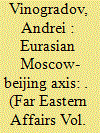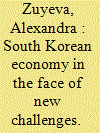|
|
|
Sort Order |
|
|
|
Items / Page
|
|
|
|
|
|
|
| Srl | Item |
| 1 |
ID:
189297


|
|
|
|
|
| Summary/Abstract |
On April 15, 2022, the Russian Academy of Sciences' Institute for Far Eastern Studies (IFES RAS) hosted the annual All-Russian Academic Conference at the Center for Social and Economic Studies of China. This year's topic was "New Horizons of China's Economy: Tasks for the 14th Five-Year Plan (2021-2025)." The conference was held in person with simultaneous broadcasting via Zoom.
|
|
|
|
|
|
|
|
|
|
|
|
|
|
|
|
| 2 |
ID:
189296


|
|
|
|
|
| Summary/Abstract |
he small Himalayan Kingdom of Bhutan, located in South Asia between China and India, has limited means and resources for development. The optimal natural resource for exploitation is the system of mountain rivers and the energy they produce. At the same time, Bhutan's hydropower sector faces some obstacles to development. The main obstacles include the technical complexity of project implementation, the national debt burden, the unfavorable effect of hydroelectric power plants on wildlife in the Kingdom, the strong dependence on New Delhi's decisions, and a limited number of alternatives for partnership in the industry. This article uses a comprehensive approach to explore the available natural resources in the country and the peculiarities of their use by Bhutan, as well as to analyze the hydropower facilities already constructed in the Kingdom and those in various stages of construction.
|
|
|
|
|
|
|
|
|
|
|
|
|
|
|
|
| 3 |
ID:
189298


|
|
|
| 4 |
ID:
189300


|
|
|
| 5 |
ID:
189293


|
|
|
|
|
| Summary/Abstract |
Russian-Chinese relations in the 20 years since the signing of the Grand Treaty of June 2001 have become a key factor of global development. Despite vigorous opposition from the West, their importance in world politics has steadily risen. They have encountered major challenges at all levels of cooperation (bilateral, regional, and global), but both countries have invariably responded to them effectively. Russia's role has grown steadily in proportion to the escalation of the China-US rivalry. Russia and China have shown that they complement each other not only on the level of bilateral economic relations, but also on a global scale, allowing them to address shared problems of creating a new international order and resisting pressure from the West. Extension of the Treaty has both confirmed the strategic nature of their relations and opened new areas of collaboration - ideological and otherwise. Amid growing tensions and the creation of new blocs in the Indo-Pacific region aimed at containing China, Russian-Chinese partnership is growing stronger without becoming a formal alliance. This type of harmonious and coordinated collaboration between major powers can be described as an axis.
|
|
|
|
|
|
|
|
|
|
|
|
|
|
|
|
| 6 |
ID:
189299


|
|
|
| 7 |
ID:
189295


|
|
|
|
|
| Summary/Abstract |
The implementation of regional transformation plans in Liaoning Province aims to establish a digital intelligent manufacturing center, a comprehensive regeneration zone in Northeast China, an international shipping center in Northeast Asia, and an offshore economic development cooperation zone. Particular attention is being paid to the system of interregional cooperation with Russian regions. The modern development of Liaoning Province in cooperation with regions of the world is based on the implementation of the New Silk Road (One Belt, One Road Initiative - OBOR) global project. Liaoning Province's geographical advantages, developed infrastructure, numerous ports (Jinzhou, Dandong, Dalian, Yingkou), and developed railroad network give it major advantages over other regions of China. The Chinese side is interested in bringing dialogue with fraternal regions of Russia from humanitarian cooperation to a system of multivector partnership interaction.
|
|
|
|
|
|
|
|
|
|
|
|
|
|
|
|
| 8 |
ID:
189301


|
|
|
|
|
| Summary/Abstract |
At the turn of the 20th century, China's pristine market looked fairly enticing to Western businesses. The Anglo-Dutch Oil and Gas Company Shell (Royal Dutch Shell) capitalized on local consumer demand to sell fuel and test development mechanisms amid a situation of permanent political instability and economic turbulence. The practices developed over the previous years helped the company promptly resume work in the region after the Second World War and neatly fit into the economic system of Hong Kong, which was experiencing radical changes from the 1950s to the 1980s. Ousted from the PRC, Shell became a key player on the fuel market of the British colony, which it used as a site to hone activity mechanisms during rapid economic development and a secure base of operations in the Asia region. The Anglo-Dutch company started to recover the position it lost in China in the mid-1900s by the start of the 1980s, steadily gaining a foothold on the promising market, which boasted a substantial resource base and increasing demand for FEC products. The conditions provided by the PRC authorities allowed Royal Dutch Shell to establish and develop multichannel interaction with local companies to prospect, extract, transport, and store fuel resources, as well as to process and sell them.
|
|
|
|
|
|
|
|
|
|
|
|
|
|
|
|
| 9 |
ID:
189294


|
|
|
|
|
| Summary/Abstract |
The South Korean economic miracle is often used as an example of the consolidation of business and government in the interests of national prosperity. Thanks to rapid industrialization and the implementation of an export-oriented economic model, the Republic of Korea (ROK) acquired the status of a developed country already in the mid-1990s. An important factor of South Korea's success at the global level is the fact that the foreign economic relations of the ROK have been closely intertwined with access to world markets, technologies, and investments. However, the economic crisis triggered by the COVID-19 pandemic and global geopolitical differences have been testing even the most stable economies. Since the South Korean economy has been deeply integrated into international trade and finance, it has become very vulnerable to outside challenges. The strengthening of partnership cooperation with the US requires that President Yoon's administration dramatically diversify foreign economic ties. Of special interest here are Russian-South Korean economic ties and their prospects. At present, the two countries' economic partnership is facing a major test in the form of sanctions pressure on the Russian Federation. As for domestic challenges for South Korea, the new administration of President Yoon has inherited many unresolved problems that have only been worsening - primarily unemployment (especially among young people), inflation, a housing crisis, and the country's aging population. In this article, the authors analyze current foreign and domestic challenges facing the ROK economy. In addition, emphasis is placed on issues of Russian-South Korean economic relations.
|
|
|
|
|
|
|
|
|
|
|
|
|
|
|
|
|
|
|
|
|